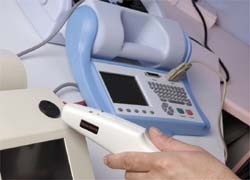One-touch testing for electromedical equipment
With `braincell´concept, Riger Medical provides a safe and effective electronical equipment for Biomedical Engeneering departments.

UK – As an international centre of excellence London’s Great Ormond Street Hospital for Children (GOSH) treats about 100,000 children annually. To ensure all electromedical equipment is available, safe and effective, the hospital’s Biomedical Engineering department is using an innovative ‘braincell’ concept developed by Rigel Medical, as part of a formal preventive maintenance protocol that covers around 18,000 electromedical devices.
The braincell technology is linked to the Rigel 277 electromedical tester and uses smart RFID data tags – extending the concept of traditional bar code test systems for the automatic identification and testing of medical equipment.
At GOSH, a central medical equipment register automatically identifies devices due for periodic safety testing in line with the IEC technical standards. When the braincell attached to a device is scanned with a read/write probe, the Rigel 277 tester automatically recalls all previous test information and prompts the engineer to repeat the required test sequence, which reduces test time significantly and eliminates the possibility of errors.
When the test is complete, data is transmitted from the implement to be held in a smart tag, enabling service records to be automatically updated after each routine. The large storage capacity of the tag means that all product information, including asset ID, test class, site and location, previous test date and test engineer, can be recorded and stay with the item for its lifetime.
GOSH also has a specialist internal mechanical and engineering section that designs and develops customised medical instruments, used particularly by research departments and clinicians. Electrical safety testing is carried out routinely on all new equipment, and following any modifications and repairs.
Bhaskar Patil, head of Medical Electronics and Mechanical Engineering at GOSH, pointed out that the hospital’s equipment is in almost constant use. ‘We aim for a 5% maximum downtime for any equipment needing maintenance, repair or testing. So the Rigel braincell system plays an integral part in this process by providing fast, one-touch retesting of medical equipment. This reduces paperwork enabling our engineers to work at maximum efficiency.’
30.08.2006





